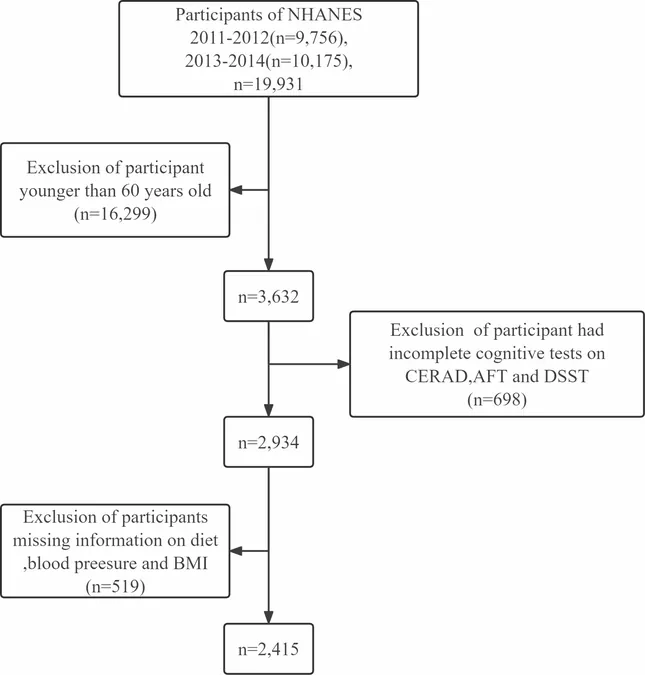
How Life's Essential 8 Could Hold the Key to Preventing Cognitive Impairment in Seniors: Insights from NHANES 2011-2014
2024-11-14
Author: Siti
As our population ages, cognitive decline has emerged as one of the most pressing health issues for older adults in the United States. According to alarming projections, by the year 2060, over 21.55 million cases of dementia are expected, signaling a dramatic rise in cognitive impairments that could hasten mortality rates. Notably, recent studies have underscored a strong correlation between cardiovascular health and cognitive functions, leading researchers to investigate a pioneering tool: the American Heart Association’s (AHA) Life's Essential 8 (LE8).
What is Life’s Essential 8?
Revised in 2022, the LE8 is an updated metric for assessing cardiovascular health (CVH) that encapsulates eight essential components: diet, physical activity, nicotine exposure, sleep health, body mass index (BMI), non-HDL cholesterol, blood glucose, and blood pressure. This new model replaces the previous 'Life’s Simple 7' by adding sleep as a key indicator, acknowledging its critical role in holistic health.
The Study Overview
Utilizing data from the National Health and Nutrition Examination Survey (NHANES) covering the years 2011-2014, this study examined how the LE8 scores correlate with cognitive impairment among individuals aged 60 and older. Three specific cognitive tests were employed: the Consortium to Establish a Registry for Alzheimer's Disease (CERAD), the Animal Fluency Test (AFT), and the Digit Symbol Substitution Test (DSST). By engaging with a sample of 2,654 participants, the research aimed to unravel the intricate relationship between cardiovascular health and cognitive function.
Findings You Can't Ignore
The results were compelling! A stronger adherence to the LE8 guidelines was linked to a significant reduction in cognitive impairment. Specifically: - The odds ratios for cognitive impairment in patients adhering to high CVH compared to those with low CVH were remarkable—0.60 for CERAD, 0.72 for AFT, and an astonishing 0.29 for DSST. - A clear linear relationship was observed between lifestyle choices and cognitive abilities, emphasizing the importance of maintaining robust cardiovascular health.
Why Does This Matter?
The intersection of cardiovascular and cognitive health isn't just academic; it's a major public health concern. Cardiovascular diseases are not only prevalent among the elderly but are also implicated in cognitive decline, with factors such as hypertension and atherosclerosis leading the charge. A deeper understanding of how lifestyle—encapsulated within the LE8—affects cognitive decline could offer actionable pathways to enhance elder health strategies, especially since approximately one-third of individuals with cardiovascular disease show some form of cognitive impairment.
The Role of Lifestyle Choices
Lifestyle factors play a pivotal role in shaping cognitive health. Regular physical activity, balanced nutrition, and adequate sleep are paramount. For instance, studies suggest the Mediterranean diet, rich in antioxidants, not only combats inflammation but also supports neuronal health. Conversely, unhealthy practices like smoking and poor sleep hygiene can accelerate cognitive decline, reiterating the importance of a comprehensive lifestyle approach.
Implications for the Future
Given the findings, enhancing public awareness about the LE8 could serve as a game changer in both preventive and interventional strategies against cognitive decline. With lifestyle modifications presenting a non-invasive, cost-effective approach to maintaining cognitive integrity, there exists an urgent need for health education initiatives targeting older populations.
Conclusion: A Call to Action
With the aging population set to grow exponentially, proactively addressing the association between cardiovascular health and cognitive function is essential. The LE8 provides a valuable framework through which individuals can improve their health prospects and combat cognitive impairments. From policymakers to healthcare providers to families, everyone has a role to play in promoting a healthier, more informed society that prioritizes the link between heart health and brain health. As we stand on the brink of a potential public health crisis, the question remains: How far are we willing to go to ensure the cognitive vitality of our aging population? The evidence suggests that it may start with how well we care for our hearts.



 Brasil (PT)
Brasil (PT)
 Canada (EN)
Canada (EN)
 Chile (ES)
Chile (ES)
 España (ES)
España (ES)
 France (FR)
France (FR)
 Hong Kong (EN)
Hong Kong (EN)
 Italia (IT)
Italia (IT)
 日本 (JA)
日本 (JA)
 Magyarország (HU)
Magyarország (HU)
 Norge (NO)
Norge (NO)
 Polska (PL)
Polska (PL)
 Schweiz (DE)
Schweiz (DE)
 Singapore (EN)
Singapore (EN)
 Sverige (SV)
Sverige (SV)
 Suomi (FI)
Suomi (FI)
 Türkiye (TR)
Türkiye (TR)